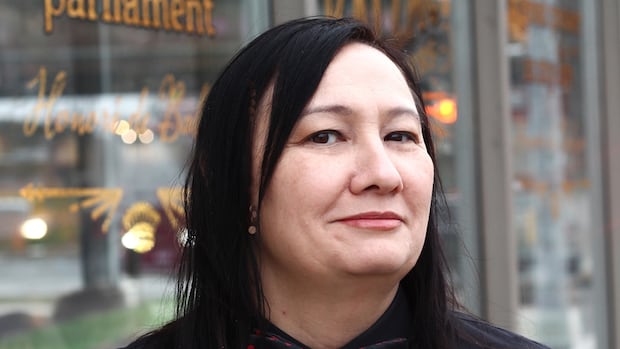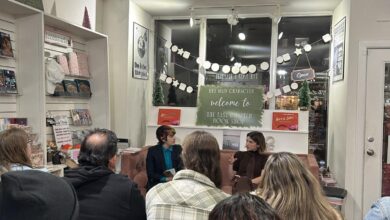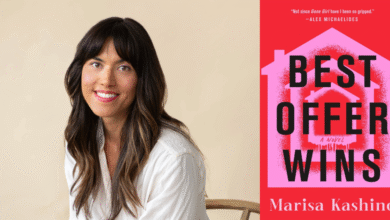Guelph author Tamara Jong hopes memoir helps people connect and ignites tough conversations

Guelph author Tamara Jong has written fiction, non-fiction and creative non-fiction before, but her latest book is deeply personal.
Worldly Girls is her own story about growing up in a faith she stopped being able to connect with and how that impacted her life and relationships.
She joined CBC K-W’s The Morning Edition host Craig Norris to talk about this book, what she experienced in writing it and what she hopes people take away from her story.
This interview has been edited for length and clarity.
Full audio of the interview can be found below.
Craig Norris: Let’s start with the title Worldly Girls. What does that mean?
Tamara Jong: So in our faith, worldly has a lot to do with somebody that is no longer one of Jehovah’s Witnesses or someone that is outside of the organization.
I know generally worldly is a term usually that means like an experienced person or sophisticated, is somebody that’s worldly wise. But in our faith, it’s kind of like something that’s not really light or wanted. You don’t really want to be that person.
Craig Norris: You have written fiction in the past. What was it that made you want to sit down and start writing about your experience in this very personal way?
Tamara Jong: Well, I did start off writing fiction because I felt it was a little bit more safer and I just kind of started writing, but everything ended up being kind of like autobiographical.
I ended up taking courses with my mentor, Ayelet Tsabari, and it really changed my writing life. I realized I really did love writing non-fiction and it kind of helped me be more brave as I got feedback from her as well as my classmates.
So I think that was the turning point for me. At first, I had always intended to write fiction. I didn’t really intend to write non-fiction and once I took those classes, it really turned me and I realized I could do it and I felt more brave doing so.
Craig Norris: What was it like for you to sit and have to think about those memories and those feelings and then lay it out there in print?
Tamara Jong: Well, at first, I have to admit it was very scary and I did eventually go through therapy just to kind of try to deal with my feelings.
I think for a long time I kind of put those things away and I thought it was something that I could just hold on to and not really talk about even.
But once I started putting it down on the page, I found it very cathartic and it felt very healing for me to just have it out there, whether or not somebody was going to read it or not.
It wasn’t something I was thinking of at the time, but I just eventually put together a collection of what would become Worldly Girls.
Craig Norris: What were you afraid of at the time? Were you afraid of the emotions that it would maybe help resurface or were you worried about what other people might think?
Tamara Jong: I would say a little bit of both, but I was very afraid actually of what either of my friends and especially people that were still Jehovah’s Witnesses and the organization would think of me.
I didn’t want to bring shame upon it. I mean, there were things obviously I was very grateful for in the organization, but there was also some harm. And so I think that was my biggest fear for the longest time of what the organization and the people in it and my friends would think of me. And also what people would think of me in the outside world thinking, ‘Oh, you know, how could she be seen as so gullible? How could she be in it for so long when it did all these things?’
I think that was part of the big issue for me.
Craig Norris: How has writing this memoir helped you heal or repair any of the relationships that you had with, I guess first of all yourself, but other people in your lives?
Tamara Jong: I really do feel like it did, not only with myself I think just in kind of reexamining my memories in a safer way. I feel like even with my relationship with my parents. I was able to look back at them as flawed humans, just like I’m a flawed human.
They made choices that they had to make, just like I had choices that I had to make. So I feel like I have a better relationship with them now, even though they’ve passed, then they did when they were living on this earth.
And I love them more for it. I guess I can see why things happen the way they did. So I feel like that was probably the biggest piece in my book, or part of it, is the forgiveness aspect and to forgive myself too, for making those choices as a young person and even later on.
Craig Norris: What have you been hearing from people who have read your memoir?
Tamara Jong: I’m really honoured by people allowing me to take up space in this world that’s so busy and there’s so many things going on. I feel like I’ve had really great feedback, even from people that used to be witnesses or people that I knew as witnesses have come back and said they really feel connection to the work and that it’s helping them.
And I think ultimately that’s the greatest gift that a writer can receive is that someone is connecting with the work.
You don’t always know who you’re writing for sometimes. A lot of people say themselves, and I guess part of that’s true, but to have that reader that understands and connects with your work, I think that was a really big take away, I guess. I didn’t really expect it to affect my heart this way.
Craig Norris: What do you hope we take away from it?
Tamara Jong: Well, I hope that it helps people connect and also opens the way for conversations to have these tough things because it covers a lot of ground — infertility, forgiveness, suicide.
If we can just talk to each other and love one another, I think that’s really important, especially today.
LISTEN | Guelph author explores grief, suicide and loss of faith in memoir Worldly Girls:
The Morning Edition – K-W6:07Guelph author explores grief, suicide and loss of faith in memoir Worldly Girls
Guelph author Tamara Jong just released a memoir called Worldly Girls. It touches on deep subjects like grief, suicide and the loss of faith. Tamara talks about how writing her memoir has helped her move on.
Source link




